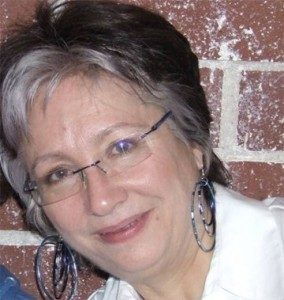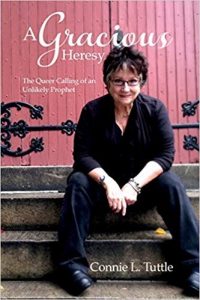A Gracious Heresy: The Queer Calling of an Unlikely Prophet, by Rev. Connie L. Tuttle:

Rev. Connie L. Tuttle’s prophetic ministry first came to my attention when I interviewed Rev. Dr. Monica A. Coleman for Changing Church: Stories of Liberating Ministers. Monica spoke highly of Connie as one of her mentors in ministry and talked about how much she loves Circle of Grace Community, a feminist church in Atlanta that Connie pastors. After Changing Church came out, I started a blog that included stories of many other ministers, both clergy and laypeople, who are changing church and society by reclaiming multicultural female divine images. Connie, I learned, was doing just that, so I interviewed her for my blog. On my blog I also included a condensed version of Monica’s story from Changing Church. Later I brought their stories, along with many others on my blog, into my book She Lives! Sophia Wisdom Works in the World.
Recently Connie’s book, A Gracious Heresy: The Queer Calling of an Unlikely Prophet, came out. I was inspired by her book and wrote the following review, originally published in Christian Feminism Today.
In A Gracious Heresy Rev. Connie L. Tuttle combines her gifts as a compelling storyteller, powerful prophet, and creative spiritual guide. Also, it took courage for her to write this book, and even more courage to live the stories she tells. Her divine call is so urgent and so palpable that nothing can stop her. She endures rigid communities, betrayal by trusted ministers, and oppressive church policies to follow her call with passion, perseverance, and unquenchable faith. She even believes she is called to play a part in changing the church.
With hands clenched over the back of a pew, Connie stands at the meeting of the Atlanta Presbytery gathered in 1994 to debate an amendment to The Book of Order that would allow for the ordination of gay men and lesbians. She takes this stand, praying that her presence, her “self-ness,” her witness, will make a difference. Then the “presence of the Holy” fills her, taking her back to her childhood on her grandparents’ farm in Oregon. With lyrical descriptions, she writes of her first experiences of the sacred in nature. These memories center her at the Presbytery meeting as a man asks, “Who are these homosexuals and what do they want with our church?”
Connie uses this question as a springboard to tell readers who she is, and she does so with authenticity, wit, and page-turning suspense. With vivid details of sounds, colors, tastes, and smells, she takes us into her childhood experiences as an “army brat” in France, Germany, the Pacific Northwest, North Carolina, and Georgia. For example, we taste with her the succulent ripe strawberries picked from a garden in a small French village and see the horrific images at Dachau, Germany. Dauchau, along with the racism she observed in Southern states, awakened Connie to the problem of evil and to her call to fight injustices. Along the way, she goes through the pain of broken relationships; the struggles of supporting her daughter as a single mom; the freedom of coming out to herself and then her family; the disappointment of thwarted explorations of her call in the wrong places, like at a Moonie retreat, and the challenge of being the first open lesbian at Columbia Theological Seminary.
Understanding her call to ministry becomes a driving force in Connie’s life. Her difficulty in defining the concept of call resonates with me.
I’ve tried and come up with different answers at different times in my life. I can point to extravagant spiritual experiences that shouted at me, the wary un-listener. Or whispers in the night that enveloped me for the moment and faded in the light of day. Call is not so much words as it is feeling. Not the imposition of feeling but the rise of relationship beyond words. (p. 23)
In one of her beautiful accounts of numinous experiences, Connie describes looking across a chasm in the universe to the Light on the other side. She knows that she can never bridge the chasm, but that she only had to reach out with her “longing” and that “God would always reach back and that God would do God’s work” and she would do hers.
Connie’s call includes becoming a prophet. She feels that she is the “very last person you would consider to be a prophet,” but that it’s not a “career option” like becoming a teacher or a doctor. “It’s a call. An irritating and irresistible call.” Injustice makes prophets “angrier than a bee swarm in a tornado.”
Prophets tend to make people uncomfortable. They irritate, intimidate, challenge, and enrage the general population. . . . They champion unpopular causes. . . . Prophets challenge the certainty of doctrine with the uncertainty of what happens when God is unleashed. They offer hope. I only pray my witness offers hope, advocates for justice, insists on compassion. (p. 2)
Another of the many parts of this book I appreciate is Connie’s setting the story of her prophetic call against the background of current events that helped shaped her. For example, she opens the chapter about starting seminary in 1983 by naming events that also occurred in that year: Nazi war criminal, Klaus Barbie, was arrested; a special Congressional commission released a report criticizing Japanese internment during World War II; Guion S. Bluford became the first African American and Sally Ride became the first American woman launched into space; Pope John Paul II visited his would-be assassin in prison to forgive him. Connie concludes the paragraph: “And I became the first open lesbian to matriculate at Columbia Theological Seminary in Decatur, Georgia. The world was changing and I felt like a part of that inevitable change. It was a hopeful time.”
Hope for change keeps Connie going as she has to defend her call to be a minister over and over again, beginning with a summons to the dean’s office soon after she enters seminary. She tries to “hold the prophetic and the pastoral in dynamic tension” as she responds to ongoing interrogations from administrators, students, professors, and even the president of the seminary. She had thought clinical pastoral education would be a safe place, but her peers and supervisor, all male, ask offensive questions about her ministry ability, her call, and her “very being.” She laments that they can only see her through some “Lesbian-shaped lens that distorted everything” she says or does.
In her second year of seminary, at a meeting to assess her candidacy for ministry, one of the committee members suggests that she should not have disclosed her sexuality. She responds, “How can I be in relationship with God if I don’t have integrity?” She also gives the committee a paper she wrote about “homosexuality and the Bible.” I wonder if she included references to Is the Homosexual My Neighbor? by Letha Dawson Scanzoni and Virginia Ramey Mollencott, a book she mentions giving to her parents when she came out because she wanted them to have this resource that takes a positive stand for LGBTQ people, supported by the Bible. Even if these committee members and others who had questioned her had read the book, they still may have been motivated more by fear than about concerns for biblical fidelity. In one meeting with the seminary president and other administrators, she has the courage to name their fear of losing financial support: “I think your real concern is economics. If you let me stay here, graduate from here, you are afraid that financial giving to this institution will suffer.”
In the last chapter, Connie takes us back to the Atlanta Presbytery meeting she describes at the opening of the book, the meeting nine years after her seminary graduation, where she continues to stand, not allowed to speak. “What mattered is that I was there,” she writes. “I was present, standing, and faithful. My silence was a voice crying in the wilderness, a clumsy prophet challenging the people of Godde.” She had begun using this spelling, Godde, to symbolize “the Sacred encompassing all gender expressions.” Connie’s graphic account of standing silently at the Presbytery meeting helps us feel her fear and grief as the vote is taken and the amendment that would have affirmed the ordination of lesbian and gay candidates failed.
That was 1994, sixteen years after the publication of Is the Homosexual My Neighbor? in 1978. Not until 2012 did the Presbyterian Church (USA) vote to allow the inclusion of lesbians and gay men to ordained ministry, twenty-six years after Connie graduated from seminary. In 2018 the church voted to ordain all LGBTQIA+ people called to ministry. Even though change came slowly, too late for Connie and many others who suffered rejection, I believe her tenacious prophetic witness contributed to these important changes. In the Epilogue we also learn that although the Presbyterian church refused to ordain Connie, in 1995 Circle of Grace, a progressive, ecumenical, feminist church in Atlanta, Georgia, ordained her; she has served as pastor of this church since then.
I highly recommend A Gracious Heresy: The Queer Calling of an Unlikely Prophet to all who delight in a captivating story and who want to join the story of bringing liberating change to church and society. The thought-provoking questions at the end of the book provide a guide.
Review of A Gracious Heresy: The Queer Calling of an Unlikely Prophet, originally published in Christian Feminism Today. Reposted with permission.
